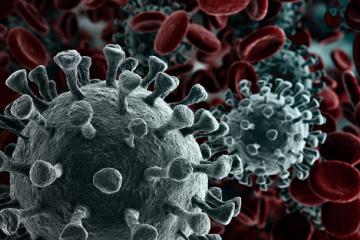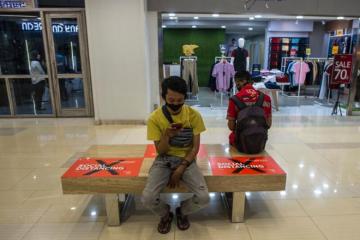
Data collection, new RCTs, and policy guidance to inform pandemic response and recovery

It has now been more than a year since the Covid-19 pandemic began closing schools and businesses and filling hospitals. The past year has been filled with tragedy and sacrifice—but, critically, also innovation, as researchers and policymakers addressed new challenges with creative solutions. But just because this pandemic was unprecedented in scope doesn’t mean evidence can’t inform decision-making. Existing and newly generated evidence has informed many policies over the past year, providing a roadmap for incorporating evidence into even the most timely responses.
J-PAL’s affiliated researchers and staff have worked alongside policymakers around the world to support use of data in decision-making for pandemic response, at many points along the journey from research to policy.
Collecting data to provide real-time insights to inform emergency response
J-PAL researchers quickly adapted to focus on providing much-needed information about on-the-ground realities to help governments understand the full extent of the problem before rolling out responses.
For example, in Indonesia, J-PAL Southeast Asia (SEA) Scientific Directors Rema Hanna and Ben Olken worked with the National Development Planning Agency to conduct a nationwide online survey to learn how the lives of poor households were affected by Covid-19, to inform expansion of the government’s social protection policies addressing the pandemic. Similarly, in Togo, researchers used satellite imagery and phone data to assist the government in targeting cash transfers to the most vulnerable individuals impacted by Covid-19.
Working with policymakers to quickly fund and launch pandemic-related research
J-PAL has prioritized funding research to understand how to mitigate the effects of Covid-19. Seven J-PAL initiatives opened rounds for proposals dedicated to funding rapid, policy-relevant, and safe research relevant to mitigation and recovery. Over the spring and summer of 2020, J-PAL funded 34 research proposals for a total of more than $1.5 million. Many have already provided useful information on the design and effectiveness of response programs.
For example, in Italy, researchers evaluated the effectiveness of an online tutoring program designed to address inequalities in education exacerbated during the pandemic. After only three months, the program improved students’ academic performance and well-being.
And in West Bengal, India, researchers sent short videos shot by a celebrity with tips for Covid-19 prevention to 25 million people. The intervention increased preventative behaviors and symptom reporting. Researchers are now assisting with the scale-up across West Bengal. Other evaluations by J-PAL affiliated researchers have also already reported results that have fed back into the design and roll out of effective response programs.
Drawing from existing evidence to provide advice to governments
J-PAL and our affiliated researchers joined many conversations with governments interested in using existing evidence to inform their pandemic response.
Early in the pandemic, J-PAL’s Global Executive Director, Iqbal Dhaliwal, joined the Government of Punjab, India’s Group of Experts for Covid-19 Relief to co-develop policy measures on agriculture, education, digitization, and social protection. Many of the recommendations made by J-PAL were included in the final strategy report agreed to by the government.
In Chile, J-PAL Latin America and the Caribbean (LAC) has also worked closely with the government across many sectors. Scientific Director Francisco Gallego, affiliate Claudia Martinez, and J-PAL staff worked with the Ministry of Finance to provide recommendations based on a large body of research to inform the design of Chile’s cash transfer pandemic relief program, which has now reached more than three million workers who were not formally employed.
Also in Chile, J-PAL staff participated in a working group to advise the Ministry of Education on evidence-based interventions to prevent school dropout. Based on promising results, Francisco and J-PAL LAC are now working with the Ministry of Education to test and expand upon an SMS intervention aimed at promoting enrollment for the 2021 school year among students (grades 1-12) who had previously dropped out of school.
And in Morocco, the J-PAL/Evidence for Policy Design Morocco Employment Lab, created in partnership with the US Millennium Challenge Corporation and MCA-Morocco, worked with the Moroccan Ministry of Labor to examine the effects of Covid-19 on employment in Morocco, drawing on lessons from international evidence. These conversations paved the way for further research in public policy response to challenges identified.
Disseminating lessons on Covid-related topics to facilitate learning
J-PAL evidence has informed broader conversations about how to address challenges brought on by the pandemic. For example, in 2020, J-PAL North America (NA) released a meta-analysis with Education Sector co-Chair Phil Oreopoulos that found that tutoring was a consistently effective strategy to help students who have fallen behind to catch up.
To date, the report has been downloaded nearly 5,000 times and been cited in major federal and state policy proposals for how to bolster student learning in the face of the pandemic. As one recent example, leaders within the California Governor’s Office shared that J-PAL’s tutoring research was especially useful as they considered how best to deploy K-12 stimulus funding to combat learning loss.
Collaborating with researchers, policymakers, and implementers to identify key challenges emerging for which additional research is needed
The pandemic has highlighted many open questions. What are the best ways to address the intersection of poverty and climate change—a question becoming increasingly important as millions around the world are now more vulnerable to climate shocks after enduring the economic shocks of the pandemic? What are the best ways to target and deliver government relief programs? How can we prevent the spread of misinformation and restore trust in health systems and government institutions?
As we progress to the next phase of post-pandemic recovery, J-PAL’s research initiatives are already considering how to encourage research that tackles these and other questions. With an ambitious research agenda focused on the intersection of poverty and critical social issues, we hope to contribute to not only recovering from this pandemic but also building a stronger foundation from which to respond to future emergencies.
As always, visit J-PAL’s Covid-19 page for more information on our ongoing response to the pandemic.


